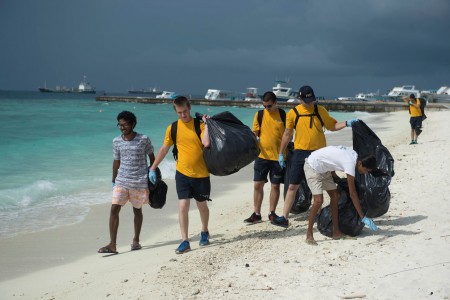Electricity used for air-conditioning accounts for 60 to 70 percent of energy consumption by households and offices in the Maldives, Minister of Environment and Energy Thoriq Ibrahim has revealed.
In his message on the occasion of World Energy Day yesterday (October 22), Thoriq noted that the slogan for the ministry’s campaign to conserve and reduce energy use is ‘It’s cool at 25’.
“Studies show that the most appropriate temperature for cooling buildings in the Maldives is 25 degrees celsius,” he said.
“Therefore, maintaining temperature at this level will benefit us directly and indirectly. My hope is for the Maldives to become an example for other countries in energy use.”
Thoriq noted that the Maldives had one of the highest rates of energy use per capita in the South Asia region, adding that the vulnerability of the economy to changes in the price of oil poses threats to “Maldivian sovereignty”.
Thoriq said energy security was essential for a developing country.
Individuals could also contribute to energy saving by using environment-friendly energy efficient appliances, he continued, which though expensive would reduce costs in the long-term.
The year-long ‘It’s cool at 25’ energy saving campaign was launched this morning at the head office of the State Trading Organisation (STO) in Malé.
Speaking at the launching ceremony, Thoriq said about MVR8,000 (US$519) – or seven percent – from electricity bills could be saved annually by raising the temperature on air-conditioning units.
For a household with three 9,000 BTU air-conditioning units, Thoriq said about MVR18,000 (US$1,167) a year could be saved by setting the temperature to 25 degrees celsius.
Moreover, a one percent reduction in oil imports would amount to US$5 million, Thoriq observed.
STO Managing Director Adam Azim meanwhile noted that a one percent reduction in electricity bills would result in enough savings to build homes for 75 families.
Substantial savings have been made through STO’s ‘Save 50 million’ cost-cutting efforts, Azim said.
Renewable energy
In his Energy Day message, Thoriq also stressed the importance of using renewable sources of energy for sustainable economic development.
Last month, the energy ministry announced plans to generate 30 percent of electricity used during daylight hours in the 196 inhabited islands of the Maldives from renewable energy sources.
 A function was held to mark World Energy Day yesterday on the island of Kudahuvadhoo in Dhaalu atoll to establish a 203 kilowatt photovoltaic (PV) system with assistance from the German government.
A function was held to mark World Energy Day yesterday on the island of Kudahuvadhoo in Dhaalu atoll to establish a 203 kilowatt photovoltaic (PV) system with assistance from the German government.
At the event, an agreement was signed between the environment ministry and GIZ (German Federal Enterprise for International Cooperation) to hand over the PV system.
According to the ministry, the government’s utility company – the Fenaka Corporation – would be responsible for operating and maintaining the system.
The Kudahuvadhoo island council meanwhile endorsed the ‘It’s cool at 25’ energy saving campaign before a children’s fair was held in the evening.
“In this fair prizes were awarded to children who took part in the activities like drawings related to energy efficiency,” explained the environment ministry. “In this fair, equipments related to energy day and energy efficiency were exhibited to the visitors.”
An awareness raising workshop for the public was meanwhile held today “to provide information on the PV system established in the island and the energy efficiency” with presentations given by the ministry and the Maldives Energy Authority.
Speaking at yesterday’s ceremony, Thoriq noted that 30 percent of GDP in the Maldives was used to import oil at a cost of US$500 million, which was “a challenge to reaching sustainable development” and “a major burden on the economy”.
Generating electricity from renewable sources would reduce the dependency on fossil fuels, Thoriq said.
Diesel fuel accounts for the bulk of the energy supply in the country – about 82.5% in 2009.
According to the Maldives Customs Service, of the MVR7.2 billion (US$466.9 million) worth of goods imported in the first quarter of 2014, one-third was spent on petroleum products.
Thoriq told state broadcaster Television Maldives (TVM) this week that solar panels would be installed in five islands in 2015, including a 1.5 megawatt PV system in Addu City and a 4 megawatt system in Malé.
The environment ministry was also studying the possibility of generating electricity through other renewable sources, Thoriq said, such as tidal energy and wind.
In January, a pioneering desalination project on the island of Gulhi, in Kaafu atoll became the first place in the world to produce desalinated drinking water using waste heat from electricity generation.
In August, the environment ministry announced a number of initiatives to minimise the country’s dependence on fossil fuels, including the Scaling-Up Renewable Energy Programme (SREP) set to “transform the Maldives energy sector.”
